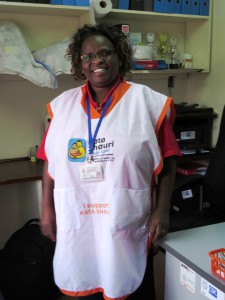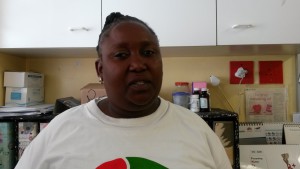
Rahab Njoki, Mentor Mother Team Leader
“One reason I would see in why women present very late [in their pregnancy] is their economic status. The community we serve here is lower income and so a pregnant woman may listen to advice from neighbours which can discourage them…Then there are those who believe that since they feel fine, they will wait as long as possible before coming in.” — Rahab Njoki, m2m Mentor Mother Team Leader from Nairobi, Kenya
m2m’s Community Mentor Mothers, like Musana Aisha from Uganda who is featured in
this video, are working to address the challenge of women not accessing medical care early enough in their pregnancy. They identify women in the community who have not engaged with the health system, and visit them at home to educate and support them, particularly if there is a chance they have been exposed to HIV.

Dr. Mitch Besser, m2m Founder
“For mothers with HIV, early enrolment in prenatal care is particularly impactful. Mothers first diagnosed with HIV can be started on antiretroviral medicines which protect the baby from infection while inside the mother,” says m2m Founder Dr. Mitch Besser. “Fully one-third of mother-to-child transmissions occur during the pregnancy before delivery. These can be prevented if mothers are diagnosed early with HIV and started on treatment. For mothers who know their HIV status is positive, education and support can ensure that mothers continue to receive and properly take their medicines and remain enrolled in care for the duration of pregnancy and the years that follow.”
So why don’t more pregnant women receive the recommended amount of care that is so important to their health? We turned to our experts in the field to find out:
“Many women may feel fearful and decide to avoid any stress by refusing to come to the health facility because they may find out they are HIV positive. However there are also many others who decide it is better to know – and when they come they see they are not alone. I’d want to encourage my fellow mothers that they really should come to the clinic and that most importantly they should get tested. They should never assume that just because a man looks fit that he is not infected. You can only know for sure by being tested.” —
Joan, m2m client, Riruta Health Centre, Nairobi, Kenya

Phumeza, Mentor Mother
“Some of my clients say that they choose to come to the clinic later in their pregnancies to minimise the number of times they have to miss work. They do this to ensure they can still put food on their families tables. I always tell them that by doing that, they put themselves at risk of missing even more days at work when they have to care for HIV-infected children.” —
Phumeza, Mentor Mother, Khayelitsha CHC, Cape Town, South Africa

Edith Chege, Project Coordinator for HIV, PCEA
“I would say not enough women are coming in for all four ANC (antenatal care) visits. It is important for her to come for the visits so as to monitor the progress of both her and her baby to make sure that all is going well. Then by coming for the recommended visits, a pregnant woman can also plan properly for the delivery of her baby. Mentor Mothers come from within the community and they encourage mothers to come in. Mentor Mothers are knowledgeable and they work with us in the Maternal/Child Health section of the hospital. Mentor Mothers have helped us so much – I don’t know what we would be able to do without them. They are able to focus purely on clients and discuss issues that affect them either through one-on-one sessions or within the support groups. Mentor Mothers are supportive, period.” —
Edith Chege, Project Coordinator for HIV, PCEA (faith-based health facility)

Thandokazi, Mentor Mother
“Some women who already know their HIV status and have had other children think they know all they need about treatment and everything. They would come only at the seventh month because that is when they were started on treatment on their last pregnancies. In all this, they forget that protocols change and as a result, they miss the opportunity of being started and learning about their treatment in time.” —
Thandokazi, Mentor Mother, Khayelitsha CHC, Cape Town, South Africa

Yandiswa, Mentor Mother
“I have met a few women who have defaulted on their ARVs and have fallen pregnant. Most of them do not come to the clinic in fear of being found out and only come to give birth. I understand that treatment defaulters used to be shouted at by the nurses, which made them have fear. But, that is not the case anymore. All of us – nurses, doctors and Mentor Mothers – will be happy that they came and do our best to help them start and remain on their treatment from there forth.” —
Yandiswa, Mentor Mother, Khayelitsha CHC, Cape Town, South Africa
“There are women who come late at even the 34th week and the interesting thing is that most of them do not know their status. The known positives come early because we are able to identify them as they are linked to the PMTCT (prevention of mother-to-child transmission) arm of the clinic… The benefit of coming in early is that they can get the best treatment, not just knowing their HIV status. A pregnant woman who comes early will know her haemoglobin levels, be given iron and folic acid supplements which are good for both baby and Mum, be tested for syphilis and also get a urinalysis and find out her blood type. In addition they will also be weighed and undergo palpation. Coming in early is also beneficial because it gives enough time for any HIV-negative pregnant woman to be re-tested again after three months – the window period – to ensure that they are still negative.” —
Rahab Njoki, Mentor Mother Team Leader, Nairobi, Kenya




























